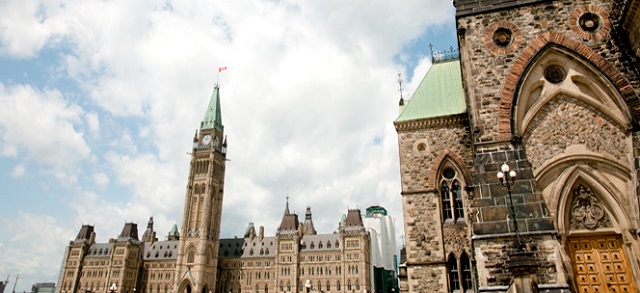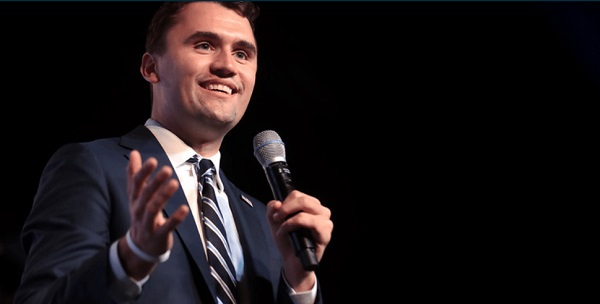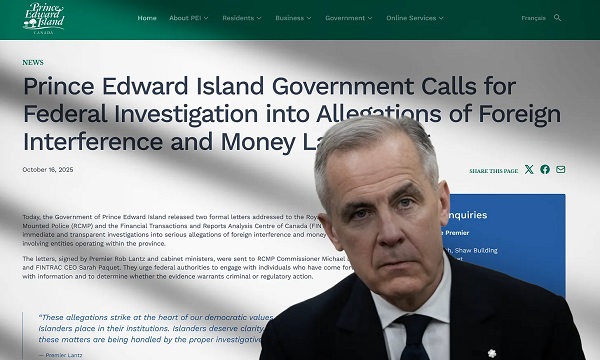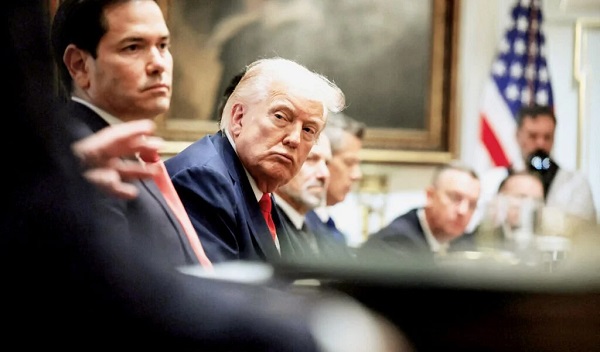Business
Poll shows eight-in-10 Canadians oppose MP pay raise

The Canadian Taxpayers Federation released Leger polling showing 79 per cent of Canadians are against the upcoming member of Parliament pay raise on April 1.
“The poll results are crystal clear: the vast majority of Canadians don’t think MPs deserve a raise,” said Franco Terrazzano, CTF Federal Director. “It seems like the only Canadians who strongly support an MP pay raise are the politicians themselves.”
The Leger poll asked Canadians if they support or oppose the upcoming MP pay raise. Results of the poll show:
- 59 per cent strongly oppose
- 20 per cent somewhat oppose
- 10 per cent somewhat support
- 3 per cent strongly support
- 9 per cent unsure
Among those decided on the issue, 86 per cent of Canadians oppose the MP pay raise.
MPs give themselves pay raises each year on April 1, based on the average annual increase in union contracts with corporations that have 500 or more employees.
A backbench MP’s salary is currently $203,100. A minister collects $299,900, while the prime minister takes home a $406,200 annual salary.
The CTF estimates this year’s pay raise will amount to an extra $6,700 for backbench MPs, $9,800 for ministers and $13,400 for the prime minister, based on contract data published by the federal government.
After this year’s pay raise, backbench MPs will receive a $209,800 annual salary, according to CTF estimates. A minister will collect $309,700 and the prime minister will take home $419,600.
“Do MPs really want to pad their pockets with higher pay as they head into an election?” Terrazzano said. “After a pandemic, tax hikes, a cost-of-living crisis and now a painful tariff war, there’s no way MPs should be taking more money from their constituents.
“If politicians want to be true champions for taxpayers, they must push to stop this MP pay raise.”
The federal government stopped automatic MP pay raises from 2010 to 2013.
Business
Ford’s Whisky War

 Marco Navarro-Génie
Marco Navarro-Génie
One could do a whole series of opinion and research pieces on how poorly educated Canadian politicians are about economic and trade principles. Below is my latest on the topic, focusing on Doug Ford’s latest philistine tantrum. My next piece will be on Wab Kinew. Writing on their lack of discipline and poor habits can be a cottage industry for commentators.
Haultain’s Substack is a reader-supported publication.
To receive new posts and support our work, please consider becoming a free or paid subscriber.
Try it out.
When a politician pours whisky on the ground, it usually means she has run out of ideas.
A few weeks ago, in September, Ontario Premier Doug Ford staged a protest worthy of a talk-show segment. Before a union crowd in Brampton, he emptied a bottle of Crown Royal onto the stage and vowed its maker, Diageo, would “pay dearly.” He threatened to pull Crown Royal (and several ither brands) from LCBO shelves, declaring Ontario would use its market power to punish the distiller for closing its Amherstburg bottling plant.
It was a vivid scene, part theatre, part tantrum, and entirely revealing.
Diageo is one of the world’s largest producers of spirits and beer, headquartered in London, England. It owns more than two hundred brands, including Johnnie Walker, Guinness, Tanqueray, and Baileys, and sells in over 180 countries. The company was formed in 1997 through the merger of Guinness and Grand Metropolitan, and it inherited Crown Royal from the old Seagram portfolio. Diageo’s Canadian operations remain significant, with the Gimli, Manitoba distillery producing every drop of Crown Royal whisky sold worldwide. It’s a Canadian product.
Diageo’s decision was not an act of treachery but arithmetic. The company plans to close its Amherstburg facility by 2026, shifting bottling to Quebec and parts of the United States. Roughly two hundred jobs will vanish. For a town of twenty-three thousand, that is a deep cut. Yet Ford’s reaction transforms an industrial decision into a political drama. He recasts an economic adjustment as a moral betrayal, as if loyalty to Ontario were a debt every business must pay in perpetuity.
That sentiment plays well at partisan rallies. But in practice, it blurs the boundary between government and market. When politicians confuse the two, policy becomes a tool of temper rather than governance.
Once a premier signals that he will use public institutions like the LCBO as weapons, investors take note. And they should. They infer that Ontario’s business climate can change with the premier’s mood. Capital, unlike politicians, is dispassionate. It goes where rules are predictable and contracts honoured, not where leaders lecture firms for disobedience.
Markets, as Adam Smith observed, are a network of trust. Replace trust with coercion or shaming, and investment flows away as surely as whisky poured on the pavement.
Ford casts himself as the friend of “working people.” Yet his fury threatens workers far from Ontario. The whisky he attacked onstage is distilled and aged in Gimli, Manitoba, from prairie grain and Canadian labour. Eighty people work at that distillery. Thousands of farmers supply its rye and corn. If Diageo decides Canada has become a political hazard, those Manitoban jobs will be among the first casualties. A tantrum in Brampton can send a chill all the way to Lake Winnipeg.
This is the irony of populist economic nationalism: in defending a few hundred local jobs, it imperils thousands more across the whole federation. It’s thoughtless.
Ford’s rhetoric also clashes with his own record. When electric-vehicle battery ventures trimmed their job projections despite billions in subsidies, the premier offered understanding, not outrage. When Brookfield shifted parts of its business operations abroad, there was no rally, no public denunciation, no bottle hitting the floor. Evidently, corporate disloyalty is tolerable, until it involves whisky.
Such inconsistency is not a principle but an impulse. Governments that choose favourites create uncertainty for everyone. When rules bend to political sentiment, each firm wonders whether it will be next in line for punishment. And so the province that once competed for investment becomes a place investors compete to avoid.
If Ford truly wished to defend Ontario’s workers, he would ask why bottling in his province became uneconomic in the first place. The answer is not a mystery. Ontario carries high energy costs, heavy regulation, and steep land prices. Every company weighs those burdens. Threatening one firm for noticing them will not persuade others to stay.
Political anger cannot repeal common sense arithmetic.
The irony deepens because Crown Royal remains Canadian in every essential sense. Its grains, water, and labour are Canadian. Its distilling craft and heritage are Canadian. Ownership by a British firm changes the shareholder, not the spirit. Punishing that success because it offends provincial pride reduces patriotism to parochialism. The brand’s global reach is a quiet advertisement for Canadian skill, and it is an achievement to be respected, not vandalized.
The premier’s defenders will say he is merely standing up for Ontario workers. But bluster is not courage. Proper defence of working people lies in creating the conditions that let enterprise and local ingenuity flourish. When government swaps policy for theatre, it only feeds resentment and starves opportunity.
Economic freedom depends on restraint. Governments must regulate and tax modestly, but they must also know when not to act. Every unnecessary intervention signals risk. The LCBO should be a neutral marketplace, not a political cudgel. Once it becomes a stage for senseless retribution, the line between free commerce and state coercion dissolves.
Ontario’s grievance is understandable; its method is reckless. A government may lament job losses, negotiate incentives, or compete for reinvestment. It may not commandeer a marketplace to punish a decision it dislikes. In a constitutional order, power is exercised through law, not vendetta.
Amherstburg deserves sympathy. No question. Two hundred jobs lost in a small town is no abstraction. Yet the premier’s faux fury will not restore them. Instead, it risks ensuring that the next investor leaves quietly rather than risk the wrath of the premier and public humiliation. Markets remember humiliation longer than speeches.
Crown Royal will survive this episode. The whisky made in Gimli will continue to be sold worldwide, enjoyed by people who have never heard, and will likely never hear, of Ontario’s premier. But the image of a provincial leader pouring it out onstage will endure too. It is an emblem of how quickly cheap populism can trade reason for spectacle.
Ontario must decide what kind of province it wishes to be: a jurisdiction that welcomes enterprise, or one that punishes it when it moves. If every business is expected to pledge fealty to the premier’s emotions, the province will learn how swiftly loyalty evaporates.
When politics meddles in markets, both lose dignity. The government becomes a performer; the market, its prop. The result is neither freedom nor prosperity, only theatre.
Doug can pour out all whisky in Ontario, if he likes. The rest of the world will raise a glass to markets that keep their cool.
Haultain’s Substack is a reader-supported publication.
To receive new posts and support our work, please consider becoming a free or paid subscriber.
Try it out.
Business
UN, Gates Foundation push for digital ID across 50 nations by 2028

From LifeSiteNews
With 30 nations enrolled, the UN and Gates Foundation’s digital ID campaign signals accelerating efforts to create a global digital infrastructure that centralizes identity and data.
The 50-in-5 campaign to accelerate digital ID, fast payment systems, and data exchanges in 50 countries by 2028 reaches a 30 country milestone.
Launched in November 2023, the 50-in-5 campaign is a joint effort of the United Nations, the Bill and Melinda Gates Foundation, and their partners to rollout out at least one component of Digital Public Infrastructure (DPI) in 50 nations within five years.
DPI is a civic technology stack consisting of three major components: digital ID, fast payment systems, and massive data sharing between public and private entities.
30 countries have now joined the UN/Gates 50-in-5 DPI campaign to rollout Digital ID, Fast Payment Systems & Massive Data Exchanges between public & private entities https://t.co/dOYCfQHObt pic.twitter.com/yP6V7zxnUD
— Tim Hinchliffe (@TimHinchliffe) October 2, 2025
50-in-5 started with 11 first-mover countries, and with the count now at 30 the participating countries include:
Bangladesh, Brazil, Cambodia, Dominican Republic, Estonia, Ethiopia, France, Guatemala, Jamaica, Kazakhstan, Lesotho, Malawi, Mexico, Moldova, Nigeria, Norway, Senegal, Sierra Leone, Singapore, Sri Lanka, South Africa, South Sudan, Somalia, Togo, Trinidad and Tobago, Uganda, Ukraine, Uruguay, Uzbekistan, and Zambia.
The 50-in-5 campaign celebrated its 30-country milestone during a sideline event at the U.N. General Assembly in New York on September 22.
There, government officials, like Ukraine’s deputy prime minister, praised the work of 50-in-5 while the ministers of digital economy from Nigeria and Togo called for an interoperable digital identity system for the entire African continent.
Nigeria’s Minister of Communications, Innovation and Digital Economy Bosun Tijani said that each country could build their own digital identity scheme, but that they should all be interoperable with one another – demonstrating both the digital ID and data sharing as good potential use cases for DPI.
“Nations want to maintain their own ID databases, but I think we have a unique opportunity to apply strong data exchange system interoperability,” said Tijani.
“I think a digital identity system that can go with you wherever you are going on the African continent would be a fantastic example,” he added.
Nigeria's minister of Communications, Innovation & Digital Economy Bosun Tijani calls for Digital ID to be interoperable across all Africa: "A digital identity system that can go with you wherever you go on the African continent will be fantastic." 50-in-5 https://t.co/dOYCfQHObt pic.twitter.com/KB380uQrmd
— Tim Hinchliffe (@TimHinchliffe) October 2, 2025
In March 2025, the Nigerian government published a framework to develop national Digital Public Infrastructure that would leverage digital ID to track and trace “key life events” of every citizen from the cradle to the grave.
“Throughout a citizen’s life, from birth to old age, there are marked moments of significant life events requiring support or service from the government,” the paper begins.
“Some of these services include registration of births, antenatal healthcare, vaccines, school enrollment, scholarships, health insurance for business registrations, filing of taxes, etc.”
These “life events” require every citizen to have a digital ID:
The Federal Government of Nigeria is on a mission to appropriately deploy digital technology to support Nigerians through these significant and profound moments so they can integrate into the state and enjoy the benefits of citizenhood from cradle to old age.

Back at the 50-in-5 milestone event, Togo’s Minister of Digital Economy and Transformation Cina Lawson called for a free, cross-border, interoperable digital ID powered by the Modular Open Source Identity Platform (MOSIP).
MOSIP is a Gates-funded platform that “helps govts & other user organizations implement a digital, foundational identity system.”
Said Lawson, “We’ve initiated conversations with our neighbors, namely Benin, to have interoperability of our ID systems, but also Burkina Faso and other countries such as Senegal, because we’re using MOSIP platform, so what we do is that we host meetings of countries that are interested the platform, so that we could see how we [are] operating it and so on.”
“Our ID system, using the MOSIP platform, is really the ID that the majority of the Togolese will have because first of all it’s free, it doesn’t require to show proof of citizenship, and so on, so that is the ID card of the poorest of the Togolese,” she added.
Togo’s Minister of Digital Economy & Transformation Cina Lawson calls for free, cross-border, interoperable Digital ID using Gates-funded MOSIP platform. UN/Gates 50-in-5 event https://t.co/dOYCfQHObt pic.twitter.com/wPC4vpms9l
— Tim Hinchliffe (@TimHinchliffe) October 2, 2025
Lawson also spoke at the 50-in-5 launch event in November 2023, where she explained that Togo’s DPI journey began with the arrival of COVID-19.
First, the government set up a digital payments system within 10 days.
“We deployed it, and we were able to pay out 25 percent of all Togolese adults, and we distributed $34 million that the most vulnerable Togolese received directly through their mobile phones,” said Lawson.
Then, came vaccine passports.
“We created a digital COVID certificate. All of a sudden, the fight against the pandemic became really about using digital tools to be more effective,” she added at the time.
Today, Togo became the first sub-Saharan African country whose digital COVID-19 vaccination certificate is recognized by the @eu_commission. Travelers with a Togolese certificate will be able to validly present it in the EU & vice versa. @AmbUETogo @KoenDoens pic.twitter.com/Uy9mRF8bkU
— Cina Lawson (@cinalawson) November 24, 2021
To get an idea where DPI is heading, Ukraine’s Deputy Prime Minister Myhailo Fedorov gave a pre-recorded speech for the 50-in-5 milestone event, saying that his country was successful in building “the state in a smartphone” via the DIIA app, which had reached 23 million users.
“For every citizen, government should be simple, convenient, nearly invisible, and accessible in just a few clicks,” said Fedorov.
“Today, 23 million people use the DIIA app […] Since the launch of DIIA in 2020, Ukrainians and the state have saved about $4.5 billion to date.”
“This is the combined anti-corruption and economic effect of digitalizing services.”
“For us, it’s powerful proof of DIIA’s efficiency and the real impact of building a digital state,” he added.
Ukraine Deputy PM Mykhailo Fedorov praises DIIA Digital ID app, with 23M users, for being a "STATE IN A SMARTPHONE" & "BUILDING AN (INVISIBLE) DIGITAL STATE." An "ANTI-CORRUPTION/ECONOMIC EFFECT OF DIGITALIZING SERVICES." Includes "ONLINE MARRIAGE" 50-in-5 https://t.co/dOYCfQHObt pic.twitter.com/MUFwbW4Yyy
— Tim Hinchliffe (@TimHinchliffe) October 3, 2025
Speaking at the World Economic Forum (WEF) Global Technology Governance Summit on April 7, 2021, Fedorov told the panelists of the “Scaling Up Digital Identity Systems” session, that it was Ukraine’s goal to “enable all life situations with this digital ID.”
“The pandemic has accelerated our progress […] People have no choice but to trust technology,” Fedorov said at the time.
“We have to make a product that is so convenient that a person will be able to disrupt their stereotypes, to break through from their fears, and start using a government-made application,” he added.
The 50-in-5 campaign is a collaboration between the Bill and Melinda Gates Foundation, the United Nations Development Program, the Digital Public Goods Alliance, the Center for Digital Public Infrastructure, and Co-Develop; with support from GovStack, the Inter-American Development Bank, and UNICEF.
The Center for Digital Public Infrastructure is backed by Co-Develop and Nilekani Philanthropies.
Nandan Nilekani is one of the architects of India’s digital identity system, Aadhaar.
Co-Develop was founded by The Rockefeller Foundation, the Bill & Melinda Gates Foundation, Nilekani Philanthropies, and the Omidyar Network.
The Omidyar Network is a funder of MOSIP.
The Digital Public Goods Alliance lists both the Gates and Rockefeller foundations in its roadmap showcasing “activities that advance digital public goods,” along with other organizations and several governments.
At last year’s Summit of the Future, 193 nations agreed to the non-binding “Pact for the Future,” which dedicates a section in its annex, the “Global Digital Compact,” to implement DPI in member states.
One year later, the U.K. announced it was going to force Britons into mandatory digital ID schemes under the guise of combatting illegal immigration.
Reprinted with permission from The Sociable.
-

 Red Deer24 hours ago
Red Deer24 hours agoThe City of Red Deer’s Financial Troubles: Here Are The Candidates I Am Voting For And Why.
-

 Business11 hours ago
Business11 hours agoUN, Gates Foundation push for digital ID across 50 nations by 2028
-

 COVID-1912 hours ago
COVID-1912 hours agoThe Trials of Liberty: What the Truckers Taught Canada About Power and Protest
-

 C2C Journal11 hours ago
C2C Journal11 hours agoCharlie Kirk and the Fragility of Civic Peace
-

 espionage1 day ago
espionage1 day agoPEI to Ottawa: Investigate CCP Footprints—Now
-

 Business2 days ago
Business2 days agoCutting Red Tape Could Help Solve Canada’s Doctor Crisis
-

 Bruce Dowbiggin2 days ago
Bruce Dowbiggin2 days agoBrokeback President: We Can’t Quit You, Donald
-

 Energy1 day ago
Energy1 day agoPrince Rupert as the Optimal Destination Port for an Alberta Crude Oil Pipeline –






